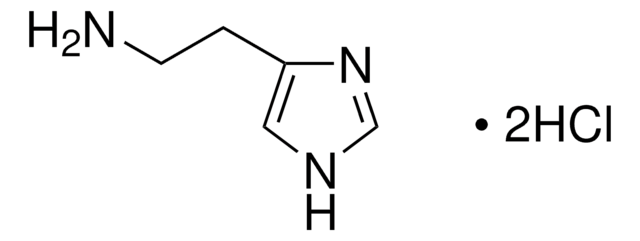1.00518
Perchloric acid
60%, for analysis EMSURE® ACS
Synonym(s):
Perchloric acid, PCA
About This Item
Recommended Products
Product Name
Perchloric acid 60%, for analysis EMSURE® ACS
grade
ACS reagent
Quality Level
product line
EMSURE®
form
liquid
concentration
60.0-62.0% HClO4
impurities
≤0.02 ppm Ba (Barium)
≤0.02 ppm Be (Beryllium)
≤0.02 ppm Li (Lithium)
≤0.02 ppm Mn (Manganese)
≤0.02 ppm Sr (Strontium)
≤0.05 ppm Al (Aluminium)
≤0.05 ppm As (Arsenic)
≤0.05 ppm Cd (Cadmium)
≤0.05 ppm Co (Cobalt)
≤0.05 ppm Ge (Germanium)
≤0.05 ppm Mo (Molybdenum)
≤0.05 ppm Pb (Lead)
≤0.05 ppm Tl (Thallium)
≤0.05 ppm V (Vanadium)
≤0.1 ppm Ag (Silver)
≤0.1 ppm Bi (Bismuth)
≤0.1 ppm Cu (Copper)
≤0.1 ppm K (Potassium)
≤0.1 ppm Ni (Nickel)
≤0.1 ppm Ti (Titanium)
≤0.1 ppm Zn (Zinc)
≤0.1 ppm Zr (Zirconium)
≤0.5 ppm Ca (Calcium)
≤0.5 ppm Free chlorine (Cl)
≤0.5 ppm Mg (Magnesium)
≤0.5 ppm Na (Sodium)
≤1 ppm Heavy metals (as Pb)
≤1.0 ppm Fe (Iron)
≤10 ppm Chlorate (ClO3)
≤10 ppm Sulfate (SO4)
≤10 ppm Total nitrogen (N)
≤3 ppm Chloride (Cl)
≤5 ppm Phosphate and Silicate (as SiO2)
ign. residue
≤30 ppm (as sulfate)
color
APHA: ≤10
density
1.53 g/cm3 at 15 °C
storage temp.
15-25°C
SMILES string
OCl(=O)(=O)=O
InChI
1S/ClHO4/c2-1(3,4)5/h(H,2,3,4,5)
InChI key
VLTRZXGMWDSKGL-UHFFFAOYSA-N
Looking for similar products? Visit Product Comparison Guide
Application
- 3D Hierarchical Polyaniline-Metal Hybrid Nanopillars: This study demonstrates the utility of 60% perchloric acid in fabricating polyaniline-metal hybrid nanopillars, which are employed for antibacterial applications. The research highlights innovative uses in material science, contributing to advancements in nanotechnology and biocidal applications (Kim et al., 2021).
- Highly Sensitive Levodopa Determination: The role of 60% perchloric acid in analytical chemistry is showcased through its use in the sensitive determination of Levodopa via adsorptive stripping voltammetry. This method significantly enhances the analytical capabilities for studying pharmacological agents (Górska et al., 2020).
- A mechanism for the enhanced attachment and proliferation of fibroblasts: This article explores how 60% perchloric acid is used to treat surfaces to improve cellular attachment and proliferation, an essential study for material science applications aimed at biomedical engineering and tissue regeneration (Ni et al., 2014).
- Pixel intensity and fractal dimension of periapical lesions: The use of 60% perchloric acid in dental research for improving the imaging and diagnosis of periapical lesions is detailed. This application underlines its significance in enhancing diagnostic precision in dental medicine (Soğur et al., 2013).
- Measurement of urinary catecholamines in small samples for mice: This study utilizes 60% perchloric acid for the extraction and measurement of catecholamines from small biological samples, illustrating its crucial role in biochemical analysis and pharmacokinetic studies (Smith et al., 2013).
Analysis Note
Color: ≤ 10 Hazen
Chlorate (ClO₃): ≤ 10 ppm
Chloride (Cl): ≤ 3 ppm
Phosphate and Silicate (as SiO₂): ≤ 5 ppm
Free chlorine (Cl): ≤ 0.5 ppm
Sulfate (SO₄): ≤ 10 ppm
Total nitrogen (N): ≤ 10 ppm
Heavy metals (as Pb): ≤ 1 ppm
Ag (Silver): ≤ 0.1 ppm
Al (Aluminium): ≤ 0.05 ppm
As (Arsenic): ≤ 0.05 ppm
Ba (Barium): ≤ 0.02 ppm
Be (Beryllium): ≤ 0.02 ppm
Bi (Bismuth): ≤ 0.1 ppm
Ca (Calcium): ≤ 0.5 ppm
Cd (Cadmium): ≤ 0.05 ppm
Co (Cobalt): ≤ 0.05 ppm
Cu (Copper): ≤ 0.1 ppm
Fe (Iron): ≤ 1.0 ppm
Ge (Germanium): ≤ 0.05 ppm
K (Potassium): ≤ 0.1 ppm
Li (Lithium): ≤ 0.02 ppm
Mg (Magnesium): ≤ 0.5 ppm
Mn (Manganese): ≤ 0.02 ppm
Mo (Molybdenum): ≤ 0.05 ppm
Na (Sodium): ≤ 0.5 ppm
Ni (Nickel): ≤ 0.1 ppm
Pb (Lead): ≤ 0.05 ppm
Sr (Strontium): ≤ 0.02 ppm
Ti (Titanium): ≤ 0.1 ppm
Tl (Thallium): ≤ 0.05 ppm
V (Vanadium): ≤ 0.05 ppm
Zn (Zinc): ≤ 0.1 ppm
Zr (Zirconium): ≤ 0.1 ppm
Residue on ignition (as sulfate): ≤ 30 ppm
conforms to ACS
Legal Information
Signal Word
Danger
Hazard Statements
Precautionary Statements
Hazard Classifications
Acute Tox. 4 Oral - Eye Dam. 1 - Met. Corr. 1 - Ox. Liq. 1 - Skin Corr. 1A - STOT RE 2
Target Organs
Thyroid
Storage Class Code
5.1A - Strongly oxidizing hazardous materials
WGK
WGK 1
Flash Point(F)
Not applicable
Flash Point(C)
Not applicable
Certificates of Analysis (COA)
Search for Certificates of Analysis (COA) by entering the products Lot/Batch Number. Lot and Batch Numbers can be found on a product’s label following the words ‘Lot’ or ‘Batch’.
Already Own This Product?
Find documentation for the products that you have recently purchased in the Document Library.
Customers Also Viewed
Our team of scientists has experience in all areas of research including Life Science, Material Science, Chemical Synthesis, Chromatography, Analytical and many others.
Contact Technical Service











